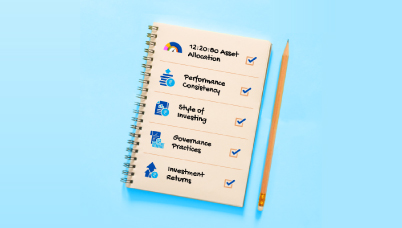Your Guide to Get the Tax Edge with Mutual Funds
Posted On Tuesday, Feb 04, 2020
In the journey of wealth creation, the approach decides your success. With a galore of investment avenues available, often, it is the choices we make that determine if the journey will be fruitful enough; whereby inflation is countered effectively and tax-efficient returns are earned.
Mutual funds are a potent avenue for long-term wealth creation. There are various categories of mutual funds -- equity-oriented, debt-oriented, hybrid, solution-oriented, and other schemes (index funds and fund of fund schemes). And each of these has sub-categories that address to a set of investment objectives or needs.
That being said, the returns earned by mutual fund schemes are market-linked and carry risk. Hence, the disclaimer: Mutual Fund investments are subject to market risks. Read all scheme related documents carefully.
Thus, selection plays a crucial role -- irrespective of the type of mutual fund scheme you decide to invest. You see, every type of mutual fund scheme occupies a distinct space on the risk-return spectrum.
If the mutual fund scheme selection is done prudently based on a host of quantitative and qualitative factors, in addition to recognising your risk profile, the broader investment objectives, financial goals you wish to address, and the time horizon to achieve those goals, then it could translate into meaningful returns for you.
The tax edge of mutual fundsUnlike other avenues where the interest earned is subject to tax; in case of mutual funds, the capital gains realised are taxable.
The tax implications depend on whether it is an equity-oriented or a debt-oriented mutual fund scheme.
Equity-oriented mutual fund:If it is an equity-oriented mutual fund, the gains realised on the units held for a period of 12 months or more, a Long Term Capital Gain (LTCG) tax applies. LTCG is taxed at the rate of 10% if the gains are in excess of Rs 1 lakh. No tax is applicable on gains below Rs 1 lakh.
For gains realised on equity mutual units held for a period of less than 12 months, a Short Term Capital Gain (STCG) applies. STCG is taxed at the rate of 15%.
Ideally, when you invest in an equity mutual fund scheme, ensure you have a time horizon of at least 3 years and willing to assume high risk.
Equity Linked Savings Scheme – Your answer to save tax under Section 80CAt the time of investing, if you are looking for a tax benefit up to Rs 1.50 lakh under Section 80C of the Income Tax Act, 1961, Equity Linked Savings Scheme (ELSS) is the answer.
As per SEBI’s categorisation norms for mutual funds, ELSS is an open-ended equity-oriented mutual fund scheme that invests a minimum 80% of its assets in equity & equity related instruments (in accordance with Equity Linked Saving Scheme, 2005 notified by Ministry of Finance).
The investment objective of an ELSS, broadly, is to achieve long-term capital appreciation by investing primarily in equity and equity-related instruments.
A distinctive feature about ELSS is that compared to the other open-ended diversified equity mutual funds, investment in ELSS is subject to a compulsory lock-in period of three years. During this period you cannot redeem your investments before the completion of three years from the date of the investment. After the lock-in, if you decide to redeem the investment on the realised gain, as per the current tax rules, LTCG tax applies.
If you are willing to take some calculated risk in the endeavour to save tax and generate wealth, ELSS could be a worthwhile tax-saving investment option.
Debt-oriented mutual fund:In case of a debt-oriented mutual fund, the holding period to classify short term and long term for capital gains is 36 months.
Gains realised on debt mutual units held for a period of less than 36 months are Short Term Capital Gains. Whereas gains on debt mutual fund units held for a period of 36 months or more are classified as Long Term Capital Gains. STCG on debt funds is taxable as per your income-tax slab.
The LTCG on debt funds is taxed at the rate of 20% with indexation benefits. The indexation benefit allows adjusting the purchase price of debt funds for inflation. This helps bring down the tax on capital gains.
That being said, when you choose mutual funds as an investment avenue, recognise the distinctive investment objective of the schemes and weigh if it is congruent with your investment objectives, financial goals, and the time in hand to achieve the goals for an incisive approach. Do not try and ape or mirror someone else’s investment portfolio. Investing is an individualistic exercise.
Barry Ritholtz, an American author, newspaper columnist, and equity analyst has aptly said, "When it comes to investing, there is no such thing as a one-size-fits-all portfolio." Therefore, personalisation is important when you construct a mutual fund portfolio.
Mutual Funds Sahi Hai!
Happy Investing!
Disclaimer, Statutory Details & Risk Factors:
The views expressed here in this article / video are for general information and reading purpose only and do not constitute any guidelines and recommendations on any course of action to be followed by the reader. Quantum AMC / Quantum Mutual Fund is not guaranteeing / offering / communicating any indicative yield on investments made in the scheme(s). The views are not meant to serve as a professional guide / investment advice / intended to be an offer or solicitation for the purchase or sale of any financial product or instrument or mutual fund units for the reader. The article has been prepared on the basis of publicly available information, internally developed data and other sources believed to be reliable. Whilst no action has been solicited based upon the information provided herein, due care has been taken to ensure that the facts are accurate and views given are fair and reasonable as on date. Readers of this article should rely on information/data arising out of their own investigations and advised to seek independent professional advice and arrive at an informed decision before making any investments.
Mutual fund investments are subject to market risks read all scheme related documents carefully.
Please visit – www.QuantumMF.com to read scheme specific risk factors. Investors in the Scheme(s) are not being offered a guaranteed or assured rate of return and there can be no assurance that the schemes objective will be achieved and the NAV of the scheme(s) may go up and down depending upon the factors and forces affecting securities market. Investment in mutual fund units involves investment risk such as trading volumes, settlement risk, liquidity risk, default risk including possible loss of capital. Past performance of the sponsor / AMC / Mutual Fund does not indicate the future performance of the Scheme(s). Statutory Details: Quantum Mutual Fund (the Fund) has been constituted as a Trust under the Indian Trusts Act, 1882. Sponsor: Quantum Advisors Private Limited. (liability of Sponsor limited to Rs. 1,00,000/-) Trustee: Quantum Trustee Company Private Limited. Investment Manager: Quantum Asset Management Company Private Limited. The Sponsor, Trustee and Investment Manager are incorporated under the Companies Act, 1956.
Related Posts
-

Do You Need to Update Your KYC/Modify KYC?
Posted On Friday, Apr 26, 2024
New KYC Regulation Effective April 1st 2024
Read More -

Are You Stuck in the Past or Ready for a Secure Future?
Posted On Wednesday, Jun 29, 2022
The ever-growing number of mutual fund schemes on offer has made it challenging for investors to select the best and most suitable one.
Read More -

Received an Increment? Step-up Your SIPs
Posted On Wednesday, Jun 01, 2022
For instance, let’s assume that you have registered for a monthly SIP of Rs 5,000 for a 10-year period and later on try to step-up the SIP at an annual frequency, say by Rs 500. In the first year...
Read More



